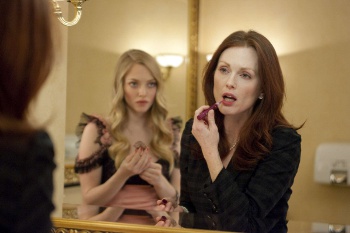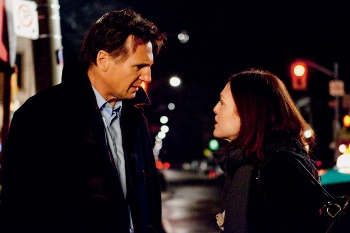Chloe
 Atom Egoyan has been on some kind of losing streak. Since his breakthrough masterpiece The Sweet Hereafter in 1997, his fiction features have gone from dense and compelling if awkward psychological dramas (1999’s Felicia’s Journey and 2002’s Ararat) to blunt, tone-deaf instruments to explore obsessions (2005’s Where the Truth Lies and 2008’s Adoration).
Atom Egoyan has been on some kind of losing streak. Since his breakthrough masterpiece The Sweet Hereafter in 1997, his fiction features have gone from dense and compelling if awkward psychological dramas (1999’s Felicia’s Journey and 2002’s Ararat) to blunt, tone-deaf instruments to explore obsessions (2005’s Where the Truth Lies and 2008’s Adoration).
The shift is a subtle one, and the gap between artful and artless is in this case small. It looks to me that like the novelist Paul Auster, Egoyan ran out of new ways to narratively play out his interests; seemingly lacking the affinity and capacity for humor, thrills, and fully human characters – which can disguise a dearth of new ideas – both auteurs have in recent years tread water in an obvious and ugly fashion.
With the caveats that it’s a remake and not written by Egoyan, Chloe seems to chart a new path for the filmmaker, even though it collapses in a fit of silliness just as it threatens to become probingly nasty. (It plots itself into a corner from which the only escape is a second-story window.) Although it has the detached Egoyan air for much of its running time, Chloe finally becomes an honest-to-goodness psychological thriller, one that employs some of Egoyan’s favorite tropes (broken people, sexual dysfunction, the natures of knowledge and truth, the subversion of audience assumptions) in the service of What happens next? tension. The difference between Chloe and most of Egoyan’s previous features is that it’s not interested in explaining or understanding motives; it’s concerned with consequences that have yet to play out. He’s finally looking forward instead of backward, and the movie as a result is engaging and direct.
Doctor Catherine Stewart (Julianne Moore) thinks her flirty husband David (Liam Neeson) is cheating on her, so she hires a prostitute, Chloe (Amanda Seyfried), as bait for him. (Probably a wiser investment than a private dick.) Chloe reports on her encounters with David, confirming his infidelity.
Egoyan undoubtedly makes significant missteps. As the Stewarts’ son, Max Thieriot is terrible, and confirms to me that the director’s gift with young actresses (Mia Kirshner in Exotica, Sarah Polley in The Sweet Hereafter, and Elaine Cassidy in Felicia’s Journey) doesn’t extend to young men. (Read into that what you will.) He seems to persist in the belief that webcams make good cinema. And that ending … . But Chloe is such a vast improvement on Egoyan’s recent output that it’s worth celebrating.
 Chloe is more gripping than what I’ll call his “puzzle” movies – not mysteries exactly, but constructed to generate mystery – even though the narrative and cinematic trickery is, perhaps, betrayed by the title and Chloe’s opening monologue.
Chloe is more gripping than what I’ll call his “puzzle” movies – not mysteries exactly, but constructed to generate mystery – even though the narrative and cinematic trickery is, perhaps, betrayed by the title and Chloe’s opening monologue.
But regardless of when you recognize what’s happening, there’s enough humanity in Chloe to maintain interest. Catherine seems almost aroused by the prostitute’s stories, and Chloe appears to derive pleasure in their detailed tellings. Both female leads project a palpable, credible need for intimacy – Moore for relief from middle age and a stale, cracked marriage, Seyfried for less-defined reasons. (Neeson doesn’t acquit himself as well as the women, but Egoyan isn’t particularly interested in him; he’s a mostly absent cad.) And there’s the restraint of Egoyan not belaboring the damage caused by both partners in the marriage, even as it’s clearly on his mind.
Most heartening, Egoyan seems newly invested in filmmaking as a narrative tool, instead of using it merely as a delivery system for what he wants to say. (Perhaps he should more often pick scripts instead of writing them himself?) The women are expressively shot – Moore feels worn but still sexually alive, and Seyfried has this cool, just-off alien beauty – and even the architecture seems to speak meaningfully.
And Egoyan makes a risky but wise choice with the revelatory cafe scene in which the three primary characters are brought together. A reaction shot of David would have made it more clear what’s going on, but the director chooses to instead emphasize Chloe.
And that’s as it should be. After all, the movie rightfully bears her name.

